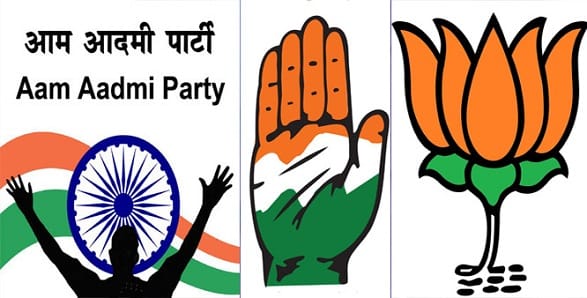Last Updated on January 7, 2025 6:39 pm by INDIAN AWAAZ
A Crucial Battle Shaping Political Fortunes and National Narrative
By Bibhudatta Pradhan / NEW DELHI
The outcome of the Delhi assembly elections, scheduled for February 5, will play a pivotal role in shaping the political fortunes of India’s three major parties in the capital while influencing the broader national narrative. Key issues such as governance models, socio-economic policies, political alliances, and the resilience of regional forces are set to be redefined through this high-stakes electoral battle.
The election will witness a three-cornered contest between the ruling Aam Aadmi Party (AAP), the Bharatiya Janata Party (BJP) and the Congress party. AAP, led by Arvind Kejriwal, aims to secure a fourth consecutive term in power, while the BJP is determined to reclaim control of the capital after a 26-year hiatus. Meanwhile, the Congress, which lost its stronghold to AAP in 2013, is striving to make a comeback.

All three parties have already launched aggressive campaigns, setting the stage for a fierce and closely watched political battle. The counting of votes for the 70-member assembly will take place on February 8, as announced by the Election Commission of India on Tuesday.
Why the Delhi Elections Matter
While Delhi accounts for only about 1% of the total parliamentary seats, its status as the national capital and the seat of the central government amplifies the significance. Governing the city, a vibrant mosaic of communities reflecting India’s rich religious, ethnic, geographical, and linguistic diversity, is not merely about political power—it’s a prestigious symbol of national influence for any party.
A Survival Test For AAP
Kejriwal, the former Delhi Chief Minister, faces the most challenging test of his political career. Following his arrest in a high-profile money laundering case and his subsequent resignation from the chief minister’s post, this election is a crucial opportunity to restore his political credibility and reclaim leadership in Delhi.
Despite accusations of corruption against several AAP leaders—dismissed by the party as political vendetta—Kejriwal remains the face of AAP’s campaign. He has declared that he will return as chief minister only if the “people’s court” delivers a favourable verdict.
In previous Delhi Assembly elections, AAP secured landslide victories–winning 67 of 70 seats in 2015 and 62 in 2020. However, this time, the party faces significant anti-incumbency sentiments and a more aggressive opposition. Its ability to remain a dominant force in Delhi’s political landscape now hinges on a strong electoral performance.
BJP’s Bid to Dominate Delhi
The BJP, currently in power at the Centre, is determined to mount a strong challenge to the AAP. Buoyed by the success of its strategies in Haryana and Maharashtra, the party is aiming to disrupt AAP’s dominance in the capital.
Failure to secure victory in Delhi would deal a symbolic blow to the BJP, undermining its narrative of Prime Minister Narendra Modi’s overarching national influence. Conversely, a win would not only consolidate its position in the capital but also reinforce its image as a dominant political force across the country.
Congress’ Fight to Regain Lost Ground
The AAP and Congress, despite being allies in the Lok Sabha elections, are contesting this election separately and have been engaged in a bitter war of words. After failing to win a single seat in the last two Assembly elections, Congress is aggressively positioning itself as an alternative force.
With its political base eroded by AAP’s rise, Congress aims to recapture anti-BJP votes and re-establish its relevance in Delhi’s political arena.
Governance Gridlock or Smooth Administration?
Delhi’s unique status as a union territory with a power-sharing arrangement between the state government and the Lieutenant Governor (LG)—an appointee of the central government—adds a layer of administrative complexity. Frequent clashes between the Delhi government and the LG have often resulted in governance deadlock, stalling key policy decisions and projects.
The outcome of the election will determine whether Delhi moves towards smoother governance with reduced friction between these two power centres or remains mired in political deadlock.
The Battle Over Freebies
In the race to woo voters, political parties are locked in fierce competition with a slew of freebies and welfare promises. The Congress has pledged financial assistance of ₹2,500 per month to women if voted into power, while AAP has promised ₹2,100 per month for women. The BJP, too, is reportedly considering similar financial aid schemes for women.
AAP has taken the lead in shaping the narrative around welfare-driven governance by promising free amenities, including financial support for temple priests, scholarships for Dalit students, and expanded old-age pensions. This has put pressure on both the BJP and Congress to follow suit with comparable schemes to stay electorally relevant.
If AAP manages to retain power in Delhi on the strength of its freebies strategy, it will further cement the trend of welfare politics as an indispensable electoral tool. However, while such initiatives resonate well with voters, they also pose significant fiscal challenges, raising concerns about long-term financial sustainability and governance priorities.
The Role of Swing Voters
Delhi’s electorate is a diverse mix of migrant workers, government employees, traders, and young professionals, each group bringing distinct voting patterns. Over the past decade, Delhi has demonstrated a consistent swing-voting pattern—favouring the BJP in national elections and backing AAP in state assembly polls.
The outcome of the upcoming election will not only reveal whether this swing-voting trend persists but also provide key insights into the shifting loyalties and evolving expectations of the capital’s electorate.
The Bigger Picture
The stakes of the Delhi Assembly elections extend far beyond the boundaries of the capital. A victory for AAP would not only solidify its status as a formidable regional force but also position it for greater influence in other states. Conversely, a BJP triumph would serve as a significant morale booster ahead of upcoming state elections, reinforcing the party’s narrative of national dominance.
(Bibhudatta Pradhan is a senior journalist based in New Delhi.)

